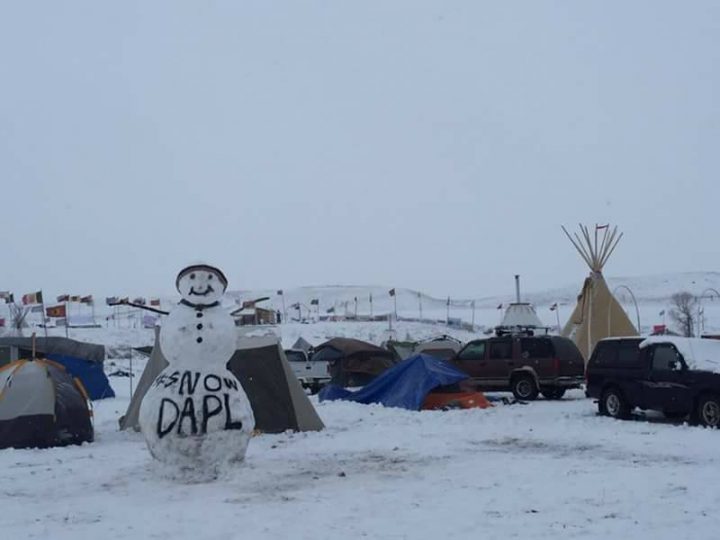After a visit by its representatives to Standing Rock, Swedish financial institution Nordea has announced that it will not back the Dakota Access Pipeline if it violates the demands of the Standing Rock Sioux Tribe.
Nordea met with tribal representatives on the ground, including Standing Rock Sioux Tribe Chairman David Archambault II. The Standing Rock Sioux Tribe urged Nordea to divest and respect the rights of Indigenous communities via a letter delivered by Sami artist and activist Sofia Jannok and Greenpeace.
At a meeting with Greenpeace and Nordea regarding the Dakota Access Pipeline, it was announced that:
- Nordea will demand guarantees from the companies building the Dakota Access Pipeline that it will not go through the Standing Rock Sioux Tribe’s reservation land. If the companies do not respect this, Nordea will start the process of selling its holdings in the companies;
- Nordea will place these companies in quarantine for six months;
- Nordea will send a letter to the companies with a clear requirement: They must respect the Standing Rock Sioux Tribe’s demands not to route the Dakota Access Pipeline in the vicinity of their land;
- If the companies do not meet that requirement within the next six months, Nordea’s Sustainable Finance team will recommend selling Nordea’s holdings in these companies.
- If the companies concerned are found to be in violation of indigenous peoples’ rights, Nordea’s Sustainable Finance team will recommend selling holdings in them;
- If the companies win a lawsuit in relation to the last stretch of the Dakota Access Pipeline, or if a change in the political situation allows companies to legally be allowed to route the pipeline near Standing Rock Sioux Tribe land, the Nordea Sustainable Finance team will recommend that Nordea sells off holdings in the companies.
The news follows similar announcements from Norway’s DNB and Odin Fund Management.
In response to the news, Greenpeace Nordic Climate and Energy Campaigner Rolf Lindahl said: “It’s an important step that Nordea put its foot down and now has specific requirements that the oil pipeline not go through the Standing Rock Sioux Tribe’s land. It sends a clear signal to the world that the rights of indigenous peoples must be respected. We encourage others to set the same demands for the companies that are building the oil pipeline.
“The fact that bank after bank is withdrawing or voicing concern over the project shows the power of people united. This is another positive development for water protectors, though it does not yet determine the pipeline’s future, which should be stopped in its entirety.”
Greenpeace USA spokesperson Mary Sweeters said: “It is becoming increasingly clear that financial institutions view the Dakota Access pipeline as a liability. Banks should not be funding projects that violate human rights and contribute to climate change. The fact that Nordea traveled to Standing Rock to consult with those on the ground and then came to this decision is significant. The recklessness of Energy Transfer Partners and Sunoco and the threat to the Standing Rock Sioux Tribe are real and can scarcely be depicted in full through media. This project is a crime against Indigenous sovereignty and human rights everywhere. It’s time for all banks invested in DAPL companies and those giving loans to get out for good.”
Perry Wheeler
Update: Nordea’s team for Responsibile Investments has recommended an exclusion of the three companies behind the Dakota Access Pipeline – Energy Transfer Partners, Sunoco Logistics and Philips 66 – after they have declined any form of dialogue about an alternative route.






